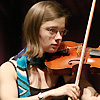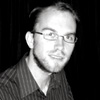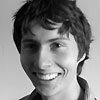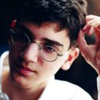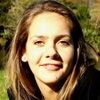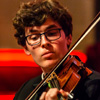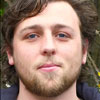Chris Bourke interview - Page 9
Chris: So what goes on in Europe…
Douglas: Is not really relevant to a New Zealand audience, though one should be aware of it. The danger of feeling like that of course is that one can very easily become complacent - a little islander. I have always taken I suppose what is called a middle road - the kind of thing Freddie Page held in contempt, but for me I think was necessary - I was mainly a few jumps ahead of my audience when I wrote those pieces, but of course time moves very fast.
Chris: I wouldn't say the Third Symphony was the middle road.
Douglas: No - a pretty old piece called Diversions for String Orchestra was a "way out contemporary piece" when the Boyd Neel Orchestra first played in the Wellington Town Hall. Yes! [chuckles] nothing in a New Zealand work like that had ever been heard. Its just five short movements, colourful, light-hearted. The B minor Sonata for Violin was played up in Wanganui and this dazed critic wrote "the atonal complexities of Mssrs Farquhar and Lilburn". [chuckles] One has to try and take a bit of that into account but mainly I just wrote what I wanted to write.
Chris: You're playing down your roll as an innovator.
Douglas: I never saw myself in that role I think unless it was to try to relate sounds more directly to my experience in this country, rather than to overseas traditions.
Chris: Then we move on to electronic music, you're so much a part of developments of era.
Douglas: Various things there. One, that after I'd done the Third Symphony I just felt that I had got myself into a swamp of serial technique and that I had to get myself out of this again, because I was going in the wrong direction and the other thing is that the whole medium of electronic sound was rather more like painting, in the sense that you're not dependent on performers in order to have a result and when you make a gesture in the studio, it's a bit like putting a brush stroke on canvas, and if you don't like that stroke, you can alter your controls and do it again right away. This gives me a great feeling of freedom and independence from certain kinds of performers here who just rejected my work out of hand, a work like the Quartet for Brass Instruments you see in 1954 was just handed back to me and I was told it was unplayable so it went into the draw until Martin Lodge pulled it out and thirty years later some students played it no problems at all [laughs] I had to live through that period. A lot of works I've had to wait up to twenty years to have performed or a second performance.
Chris: Someone coming to your music through recordings would find the real innovations are hidden as they haven't been recorded.
Douglas: That's only true except they may have been recorded late and understandably, popular pieces like "Landfall.." got recorded sooner and rightly. Then the other thing about the electronic studio is the feeling that it gave me that I was entering into a total heritage of sound, not just a narrow segment of sound that we call music. And of course I grew up not so much with music but with environmental sound in my years of imagination, so it was like coming home in a sense to use that sound. It was a very liberating thing for one's imagination, once I began to learn the techniques by which I could do this.
Chris: In early days of electronic music, based on tape recorder not synthesisers, so natural sounds played a much larger part.
Douglas: And I found for instance writing incidental music for plays on Maori themes for Broadcasting, one couldn't use an oboe or trumpet with all their European associations but one could take natural sounds and make a kind of texture out of them.
Chris: Where did you first hear of things happening in electronic music.
Douglas: I think probably through Fred Page who used to keep up with his European information which I had no time to do and at some stage he got the first recording of the Stockhausen Gesang der Jünglinge and at a certain point I borrowed a little Sony recorder and an oscillator from the Physics department and set up in the Music Room and made some exhilarating noises through them, and then I had the opportunity to go overseas to Toronto and finished up working there for three or four months.
Chris: Why Toronto.
Douglas: Because I'd met Boyd Neel who was the Dean over there and I'd read some article about the studio in Toronto which interested me. It was one of the few places offering at that time. The British hadn't begun at that stage. I suppose I was taking a big dive which took seven years to come to the surface again, but I just felt it had to be done. I'm feeling a bit dry .. would you like a Vino or something?
[Both leave for the kitchen and then return]


